Operations Management Discussion: ERP, Predictive Applications
VerifiedAdded on 2022/09/02
|5
|855
|22
Discussion Board Post
AI Summary
This discussion post examines the role of Enterprise Resource Planning (ERP) systems and predictive applications in operations management. The first discussion question evaluates how ERP systems contribute to customer intimacy, engagement, and knowledge management, highlighting their importance in fostering customer-centric approaches and efficient operations. The second question analyzes the impact of predictive applications on operations management, focusing on their ability to identify patterns and improve decision-making, particularly within the insurance industry. The post emphasizes the benefits of predictive analytics in designing marketing strategies, pricing, and risk management within the insurance sector. The assignment also references relevant research papers to support the arguments presented.
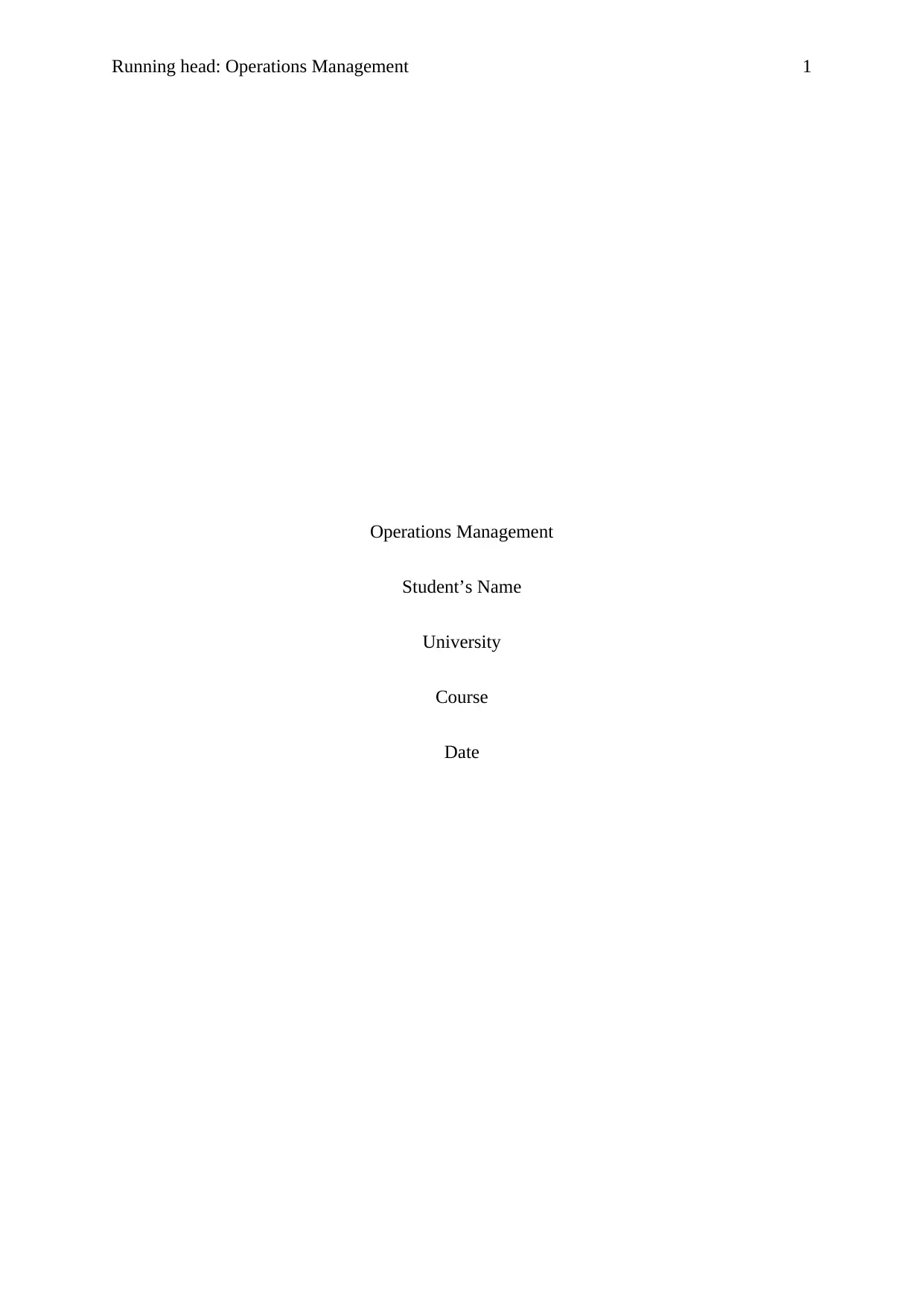
Running head: Operations Management 1
Operations Management
Student’s Name
University
Course
Date
Operations Management
Student’s Name
University
Course
Date
Paraphrase This Document
Need a fresh take? Get an instant paraphrase of this document with our AI Paraphraser
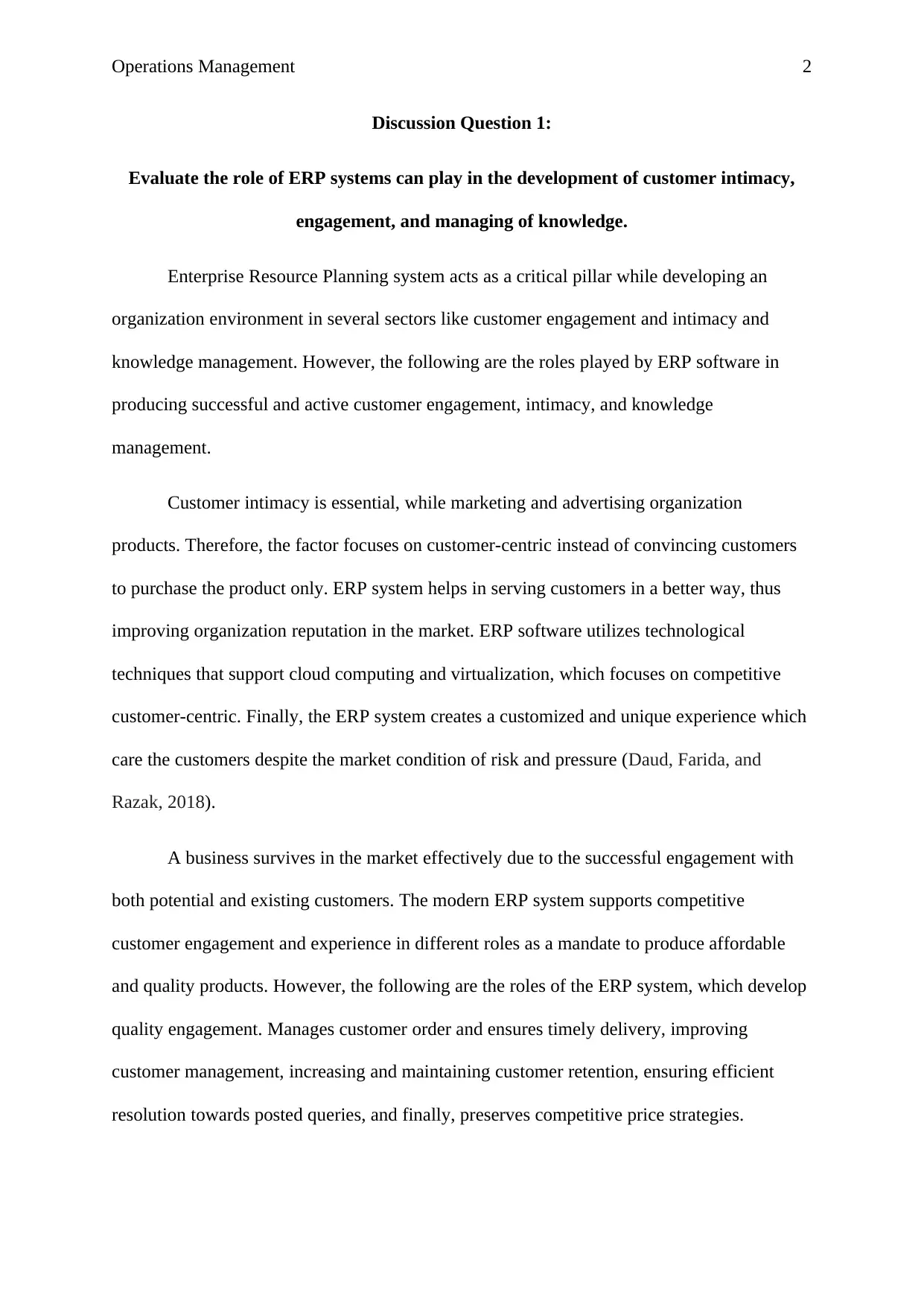
Operations Management 2
Discussion Question 1:
Evaluate the role of ERP systems can play in the development of customer intimacy,
engagement, and managing of knowledge.
Enterprise Resource Planning system acts as a critical pillar while developing an
organization environment in several sectors like customer engagement and intimacy and
knowledge management. However, the following are the roles played by ERP software in
producing successful and active customer engagement, intimacy, and knowledge
management.
Customer intimacy is essential, while marketing and advertising organization
products. Therefore, the factor focuses on customer-centric instead of convincing customers
to purchase the product only. ERP system helps in serving customers in a better way, thus
improving organization reputation in the market. ERP software utilizes technological
techniques that support cloud computing and virtualization, which focuses on competitive
customer-centric. Finally, the ERP system creates a customized and unique experience which
care the customers despite the market condition of risk and pressure (Daud, Farida, and
Razak, 2018).
A business survives in the market effectively due to the successful engagement with
both potential and existing customers. The modern ERP system supports competitive
customer engagement and experience in different roles as a mandate to produce affordable
and quality products. However, the following are the roles of the ERP system, which develop
quality engagement. Manages customer order and ensures timely delivery, improving
customer management, increasing and maintaining customer retention, ensuring efficient
resolution towards posted queries, and finally, preserves competitive price strategies.
Discussion Question 1:
Evaluate the role of ERP systems can play in the development of customer intimacy,
engagement, and managing of knowledge.
Enterprise Resource Planning system acts as a critical pillar while developing an
organization environment in several sectors like customer engagement and intimacy and
knowledge management. However, the following are the roles played by ERP software in
producing successful and active customer engagement, intimacy, and knowledge
management.
Customer intimacy is essential, while marketing and advertising organization
products. Therefore, the factor focuses on customer-centric instead of convincing customers
to purchase the product only. ERP system helps in serving customers in a better way, thus
improving organization reputation in the market. ERP software utilizes technological
techniques that support cloud computing and virtualization, which focuses on competitive
customer-centric. Finally, the ERP system creates a customized and unique experience which
care the customers despite the market condition of risk and pressure (Daud, Farida, and
Razak, 2018).
A business survives in the market effectively due to the successful engagement with
both potential and existing customers. The modern ERP system supports competitive
customer engagement and experience in different roles as a mandate to produce affordable
and quality products. However, the following are the roles of the ERP system, which develop
quality engagement. Manages customer order and ensures timely delivery, improving
customer management, increasing and maintaining customer retention, ensuring efficient
resolution towards posted queries, and finally, preserves competitive price strategies.
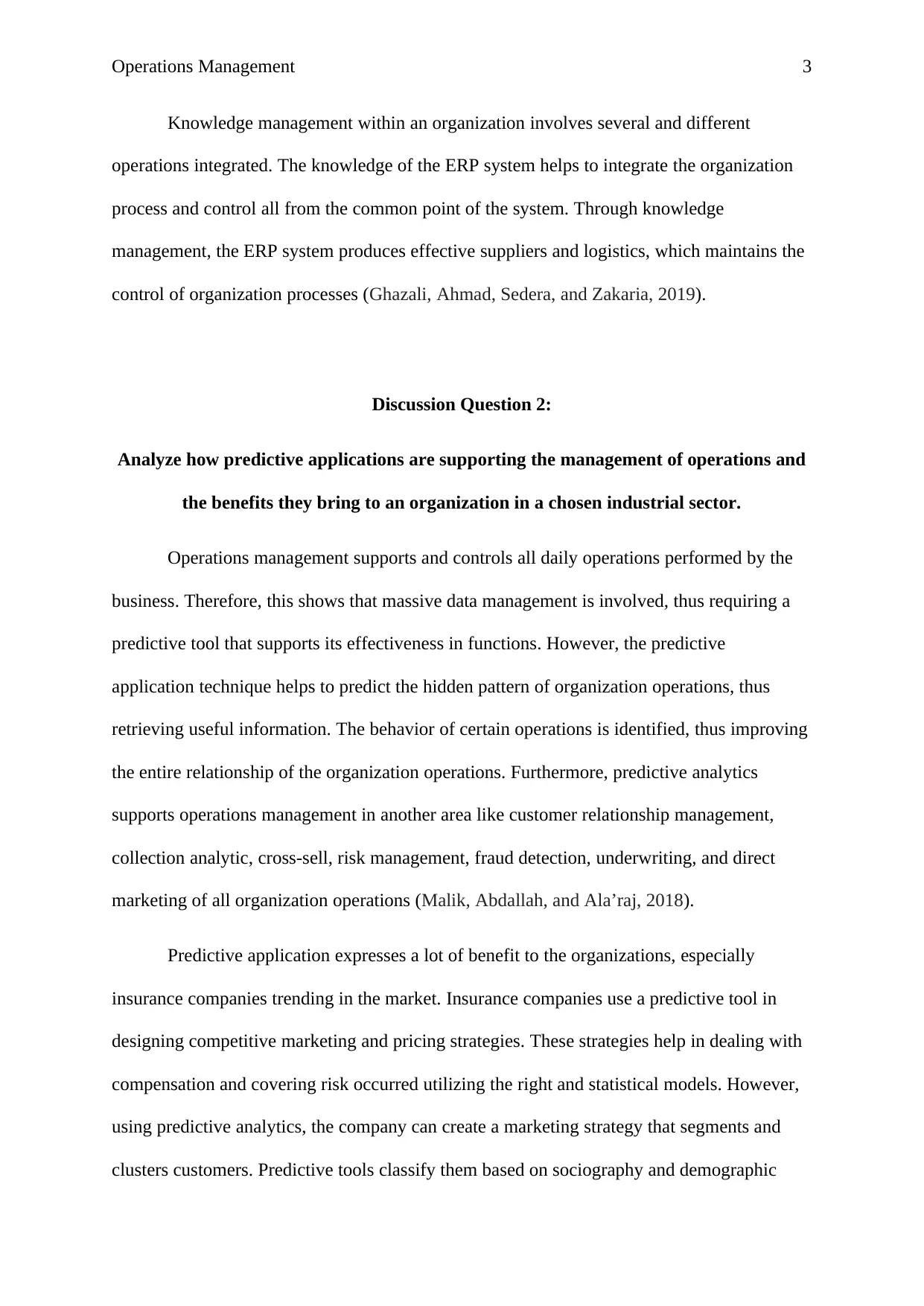
Operations Management 3
Knowledge management within an organization involves several and different
operations integrated. The knowledge of the ERP system helps to integrate the organization
process and control all from the common point of the system. Through knowledge
management, the ERP system produces effective suppliers and logistics, which maintains the
control of organization processes (Ghazali, Ahmad, Sedera, and Zakaria, 2019).
Discussion Question 2:
Analyze how predictive applications are supporting the management of operations and
the benefits they bring to an organization in a chosen industrial sector.
Operations management supports and controls all daily operations performed by the
business. Therefore, this shows that massive data management is involved, thus requiring a
predictive tool that supports its effectiveness in functions. However, the predictive
application technique helps to predict the hidden pattern of organization operations, thus
retrieving useful information. The behavior of certain operations is identified, thus improving
the entire relationship of the organization operations. Furthermore, predictive analytics
supports operations management in another area like customer relationship management,
collection analytic, cross-sell, risk management, fraud detection, underwriting, and direct
marketing of all organization operations (Malik, Abdallah, and Ala’raj, 2018).
Predictive application expresses a lot of benefit to the organizations, especially
insurance companies trending in the market. Insurance companies use a predictive tool in
designing competitive marketing and pricing strategies. These strategies help in dealing with
compensation and covering risk occurred utilizing the right and statistical models. However,
using predictive analytics, the company can create a marketing strategy that segments and
clusters customers. Predictive tools classify them based on sociography and demographic
Knowledge management within an organization involves several and different
operations integrated. The knowledge of the ERP system helps to integrate the organization
process and control all from the common point of the system. Through knowledge
management, the ERP system produces effective suppliers and logistics, which maintains the
control of organization processes (Ghazali, Ahmad, Sedera, and Zakaria, 2019).
Discussion Question 2:
Analyze how predictive applications are supporting the management of operations and
the benefits they bring to an organization in a chosen industrial sector.
Operations management supports and controls all daily operations performed by the
business. Therefore, this shows that massive data management is involved, thus requiring a
predictive tool that supports its effectiveness in functions. However, the predictive
application technique helps to predict the hidden pattern of organization operations, thus
retrieving useful information. The behavior of certain operations is identified, thus improving
the entire relationship of the organization operations. Furthermore, predictive analytics
supports operations management in another area like customer relationship management,
collection analytic, cross-sell, risk management, fraud detection, underwriting, and direct
marketing of all organization operations (Malik, Abdallah, and Ala’raj, 2018).
Predictive application expresses a lot of benefit to the organizations, especially
insurance companies trending in the market. Insurance companies use a predictive tool in
designing competitive marketing and pricing strategies. These strategies help in dealing with
compensation and covering risk occurred utilizing the right and statistical models. However,
using predictive analytics, the company can create a marketing strategy that segments and
clusters customers. Predictive tools classify them based on sociography and demographic
⊘ This is a preview!⊘
Do you want full access?
Subscribe today to unlock all pages.

Trusted by 1+ million students worldwide
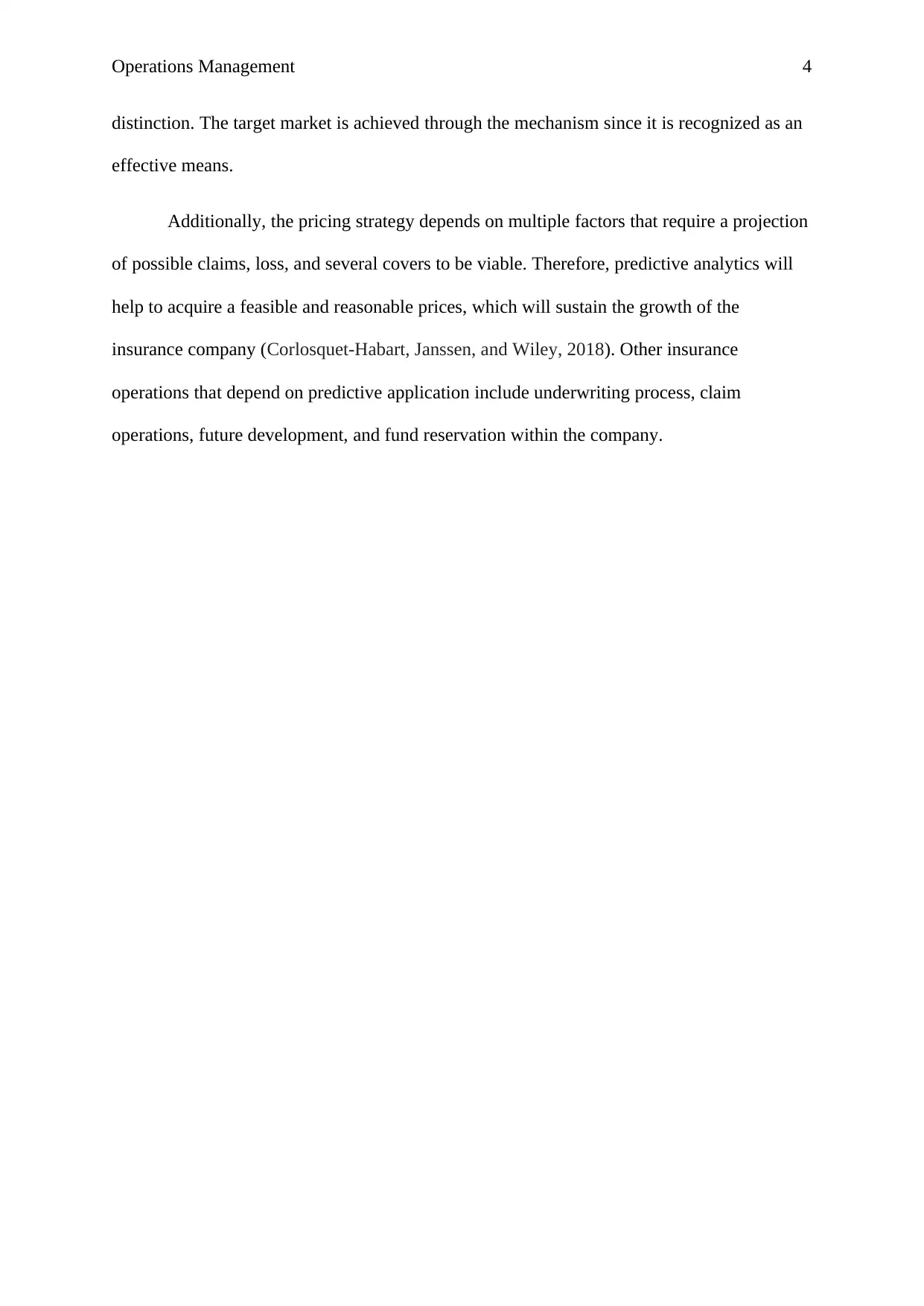
Operations Management 4
distinction. The target market is achieved through the mechanism since it is recognized as an
effective means.
Additionally, the pricing strategy depends on multiple factors that require a projection
of possible claims, loss, and several covers to be viable. Therefore, predictive analytics will
help to acquire a feasible and reasonable prices, which will sustain the growth of the
insurance company (Corlosquet-Habart, Janssen, and Wiley, 2018). Other insurance
operations that depend on predictive application include underwriting process, claim
operations, future development, and fund reservation within the company.
distinction. The target market is achieved through the mechanism since it is recognized as an
effective means.
Additionally, the pricing strategy depends on multiple factors that require a projection
of possible claims, loss, and several covers to be viable. Therefore, predictive analytics will
help to acquire a feasible and reasonable prices, which will sustain the growth of the
insurance company (Corlosquet-Habart, Janssen, and Wiley, 2018). Other insurance
operations that depend on predictive application include underwriting process, claim
operations, future development, and fund reservation within the company.
Paraphrase This Document
Need a fresh take? Get an instant paraphrase of this document with our AI Paraphraser
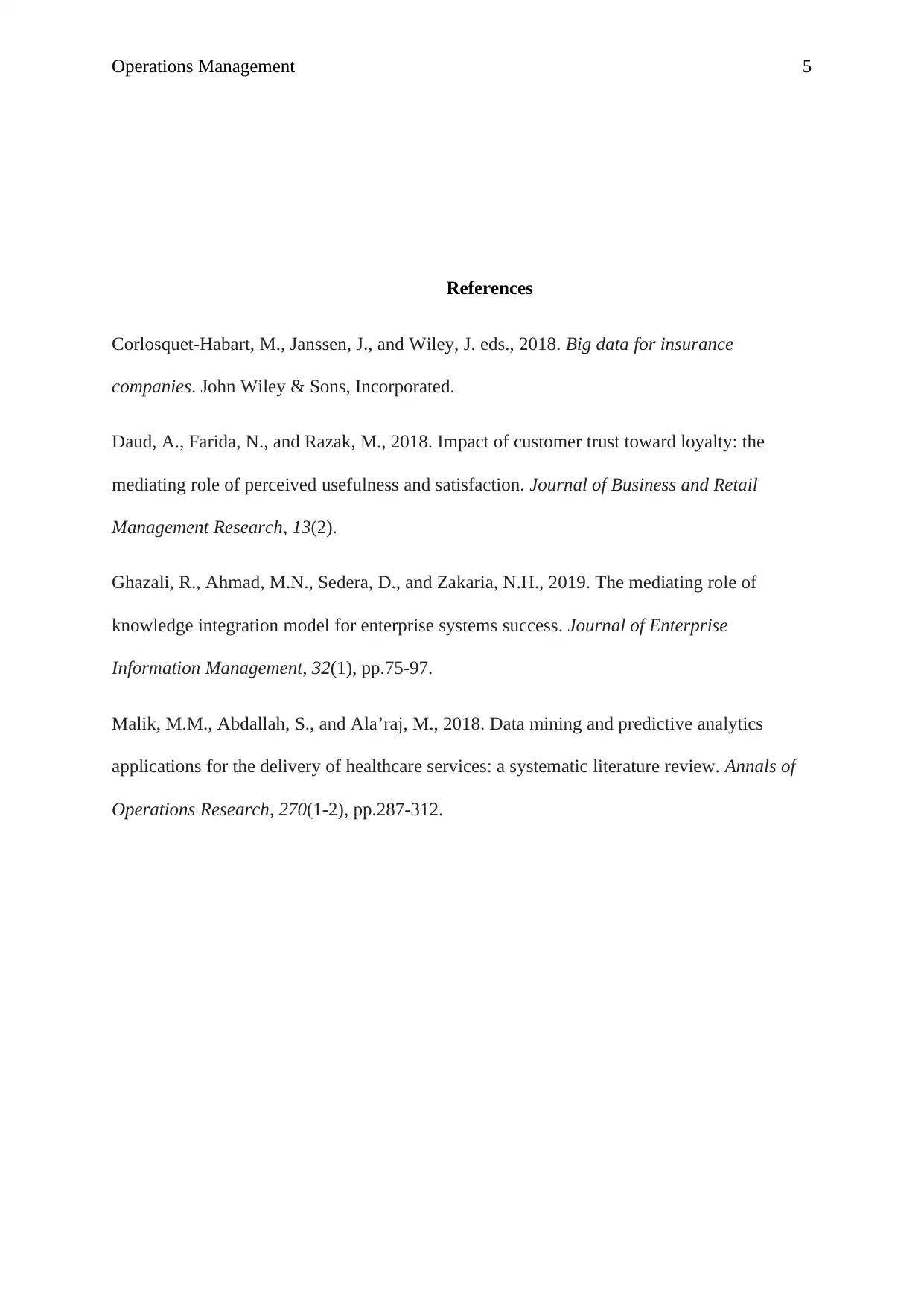
Operations Management 5
References
Corlosquet-Habart, M., Janssen, J., and Wiley, J. eds., 2018. Big data for insurance
companies. John Wiley & Sons, Incorporated.
Daud, A., Farida, N., and Razak, M., 2018. Impact of customer trust toward loyalty: the
mediating role of perceived usefulness and satisfaction. Journal of Business and Retail
Management Research, 13(2).
Ghazali, R., Ahmad, M.N., Sedera, D., and Zakaria, N.H., 2019. The mediating role of
knowledge integration model for enterprise systems success. Journal of Enterprise
Information Management, 32(1), pp.75-97.
Malik, M.M., Abdallah, S., and Ala’raj, M., 2018. Data mining and predictive analytics
applications for the delivery of healthcare services: a systematic literature review. Annals of
Operations Research, 270(1-2), pp.287-312.
References
Corlosquet-Habart, M., Janssen, J., and Wiley, J. eds., 2018. Big data for insurance
companies. John Wiley & Sons, Incorporated.
Daud, A., Farida, N., and Razak, M., 2018. Impact of customer trust toward loyalty: the
mediating role of perceived usefulness and satisfaction. Journal of Business and Retail
Management Research, 13(2).
Ghazali, R., Ahmad, M.N., Sedera, D., and Zakaria, N.H., 2019. The mediating role of
knowledge integration model for enterprise systems success. Journal of Enterprise
Information Management, 32(1), pp.75-97.
Malik, M.M., Abdallah, S., and Ala’raj, M., 2018. Data mining and predictive analytics
applications for the delivery of healthcare services: a systematic literature review. Annals of
Operations Research, 270(1-2), pp.287-312.
1 out of 5
Related Documents
Your All-in-One AI-Powered Toolkit for Academic Success.
+13062052269
info@desklib.com
Available 24*7 on WhatsApp / Email
![[object Object]](/_next/static/media/star-bottom.7253800d.svg)
Unlock your academic potential
Copyright © 2020–2025 A2Z Services. All Rights Reserved. Developed and managed by ZUCOL.





